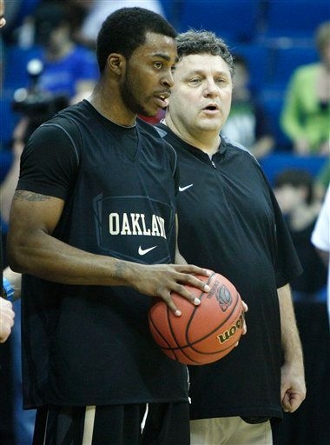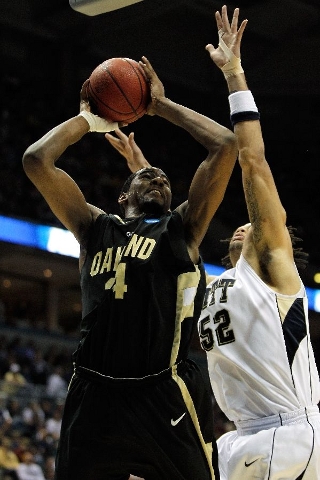BOK Center | Tulsa, OK | Tip: 11:15 A.M. CT | TV: CBS LRT Consecutive Game #185 March has been a tough month for the Texas Longhorns in recent years. In the first half of the decade, Texas was one of the nation’s best performers in the NCAA tournament. From 2002 to 2006, the Longhorns made the Sweet 16 four different times, played in one Elite Eight, and even landed in the Final Four in 2003. But since then, Texas has had difficulties advancing past the first weekend. Although the Longhorns advanced to the Elite Eight as a No. 2 seed in 2008, they lost in the second round in both 2007 and 2009, and were knocked out at the overtime buzzer in the first round by Wake Forest last season. Throw in the epic collapse by last year’s Texas team, and there’s been a lot of national attention on Texas this March. Yahoo’s Jason King claimed that Rick Barnes is the coach with the most pressure in this NCAA tournament, and he may be right. But even more than historical trends and cute storylines, the true source of pressure comes in the form of a very tough opening match-up for the Longhorns.
Reggie Hamilton and Greg Kampe are looking for the upset Predicted by many to be a No. 2 seed in this year’s field, Texas inexplicably showed up on the 4-seed line when the brackets were revealed. As an added bonus, the Longhorns were paired with the Summit League champion Oakland, a very scary squad that could easily pull off the upset. By the numbers The Grizzlies are an up-tempo team that can score the ball in a hurry. Oakland averages 72.9 possessions per game, which is the 7th-fastest pace in D-I basketball and a full six possessions per game faster than the Longhorns. Oakland has a team full of quick, athletic players that can score, and as a result, have a solid offensive efficiency mark of 1.159 points per possession. Their effective field goal percentage — a statistic that takes into account the greater value of a three-point shot — is third-best in the nation at 56.1%. All of the Golden Grizzlies have excellent handles, and it allows them to run tons of curls from the perimeter following ball screens. They also move really well without the basketball, leading to tons of open looks at the rim when defenses lose their men on the backcuts. Add in one of the nation’s premier big men, and it’s easy to see why Oakland’s offensive numbers are so potent. The Golden Grizzlies want to turn today’s game into a track meet because they simply cannot defend. They allow more than 1.03 adjusted points per possession, ranking them 200th in the country. Oakland doesn’t guard the perimeter, where opponents are shooting more than 36%, and the Grizzlies simply don’t force turnovers. Meet the Golden Grizzlies The player you’ve heard about all week is big man Keith Benson. At 6’11”, he’s much more athletic and sleek than other players his size. Benson leads Oakland with 18 points and 10.1 rebounds per game, and is guaranteed to be a first-round draft pick if the NBA doesn’t follow the same path as the NFL this summer.
Keith Benson is a force inside for Oakland Benson is tough to defend because he’s much more mobile than other big men. He can knock down the jump shot, even out to the three point line, where he is 9-for-22 on the season. Inside, his length makes it practically impossible to block his shot, and he has a solid left-handed hook. Benson isn’t just the scoring machine inside for Oakland, though. He was the Summit League’s Defensive Player of the Year, and is leading his team with 3.6 blocked shots per game. In the backcourt, Reggie Hamilton gets the Oakland offense going. A junior, Hamilton transferred from UMKC and has made an immediate impact for Coach Greg Kampe. He can drive the lane with either hand, and has such a quick first step that he can easily get to the rim or stick a quick pull-up jumper that leaves defenders stumbling backwards. The speedy Hamilton is also the facilitator in the Oakland offense. When he’s dissecting defenses with his dribble-drive, the junior always has his head up, looking for passing lanes that open up as the defense reacts. As a result, Hamilton averages more than 5.3 assists per game. Joining Hamilton in the backcourt is freshman sharpshooter Travis Bader. The 6’4″ Michigan product is averaging more than 10 points per game, in large part thanks to his ridiculous three-point shot. Bader has made 45.8% of his long-range attempts this season, and is second on the team with 201 attempts. At the three, slasher Drew Valentine is averaging 7.9 points per game. He is a steady ball-handler who can finish through traffic thanks to his strength, and he is constantly active on the glass. Valentine averages 5.6 rebounds per game for Oakland. Another excellent rebounder for the Grizzlies is senior forward Will Hudson. Even though Hudson is often at the free-throw line when Oakland runs their high-low game with Benson, he is still second on the team with 7.1 rebounds per game, and is 44th in the nation with an offensive rebounding mark of 14.1%. Guard Larry Wright was the Summit League’s Sixth Man of the Year, averaging 9.8 points per game. He is yet another long-range weapon for Coach Kampe, drilling 35.8% of his attempts from behind the arc. Another guard off the bench is tiny freshman Ryan Bass. He only averaged 9.5 minutes per game this season, but saw his average climb to 11.3 minutes in conference play. Like Hamilton, Bass is a speedster, but hasn’t been able to handle defensive pressure as well as the starter. When Hamilton needed a breather in the Summit League Championship, Oral Roberts broke out a full-court press against Bass and caused major issues. The only other player to see significant minutes in Oakland’s eight-man core rotation is guard Ledrick Eackles. Like Bass, he averaged just over 11 minutes per game in Summit League play, and averaged nearly four points per game. The son of former NBA player Ladell Eackles, Ledrick has yet to make a huge impact on the Oakland program. Keys to the game As Texas fans saw all too clearly last Saturday, the number one thing the Longhorns must do is keep Tristan Thompson out of foul trouble. Benson is an exceptional post player that is going to give Thompson a real challenge in the paint. Texas needs Tristan’s scoring punch and offensive rebounding skills to keep the offense clicking, so he simply cannot afford to pick up cheap fouls guarding the 6’11” Benson. On defense, Texas must stop Oakland’s transition game. The Golden Grizzlies score a ton of points on the fast break, but score even more on the secondary break. The Longhorns need to get down the court in a hurry and force Oakland into playing a half-court game. The Grizzlies haven’t faced a defense as good as Texas’ since they played Ohio State back in December. In that one, the Buckeyes held Oakland to just 0.862 points per possession. If Texas can keep the Grizzlies from getting a lot of easy points on the fast break and secondary break, they can have the same kind of defensive success. If Texas is able to do that, they then must also limit damage from the perimeter. While Benson is an outstanding player, he will not beat the Longhorns on his own. If Texas can shut down the transition game and prevent Oakland from knocking down threes, there is no way Oakland can win the game solely on Benson’s talent. One of the biggest reasons that teams get upset in NCAA play is hot three-point shooting from low-seeded opponents. With five different Grizzlies posting three-point percentages of greater than 35%, Texas has to make sure it doesn’t fall prey to that this morning. |










